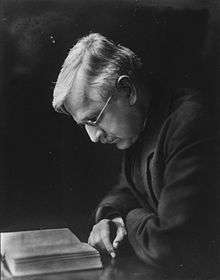Graham Wallas


Graham Wallas (31 May 1858 – 9 August 1932) was an English socialist, social psychologist, educationalist, a leader of the Fabian Society and a co-founder of the London School of Economics.
Biography
Born in Monkwearmouth, Sunderland, Wallas was educated at Shrewsbury School and Corpus Christi College, Oxford. It was at Oxford that Wallas abandoned his religion. He taught at Highgate School until 1885, when he resigned rather than participate in communion, and was President of the Rationalist Press Association.[2]
Wallas joined the Fabian Society in April 1886, following his acquaintances Sidney Webb and George Bernard Shaw. He was to resign in 1904 in protest at Fabian support for Joseph Chamberlain's tariff policy. In 1894 he was elected to the London school board as a Progressive, becoming chairman of the board's school management committee in 1897, and until he was defeated in 1907 the encouragement of educational reform and the raising of academic standards in state schools was one of his main activities.[3]
He was appointed a university extension lecturer in 1890 and lectured at the newly founded London School of Economics from 1895. In 1898 he published a biography of the early nineteenth-century utilitarian radical Francis Place. His most important academic writings were Human Nature in Politics (1908) and its successors The Great Society (1914) and Our Social Heritage 1921).[4]
Ideas
Wallas argued in Great Society (1914) that a social-psychological analysis could explain the problems created by the impact of the industrial revolution on modern society. He contrasts the role of nature and nurture in modern society, concluding that humanity must depend largely on the improvements in nurture, and put his faith in the development of stronger international operation.
In The Art of Thought (1926), he proposed one of the first models of the creative process (consisting of preparation, incubation, illumination, and verification), and which remains highly cited in scholarly works on creativity.[5]
Works
- Property Under Socialism (1889).
- What to Read: A List of Books for Social Reformers (1891).
- The Life of Francis Place, 1771-1854 (1898).
- Human Nature in Politics (1908).
- The Great Society (1914).
- Our Social Heritage (1921).
- The Art of Thought (1926).
- Social Judgment (1934).
References
Further reading
- Martin Wiener, Between two worlds : The political thought of Graham Wallas, Oxford: Clarendon Press, 1971.
External links
- Works by Graham Wallas at Project Gutenberg
- Works by or about Graham Wallas at Internet Archive
- Works by Graham Wallas, at Hathi Trust
- Works by Graham Wallas, at Unz.org
- Catalogue of the Wallas papers at the Archives Division of the London School of Economics.
- Spartacus bio